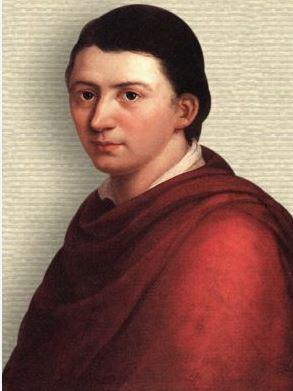Friedrich Schlegel

Friedrich Schlegel (1772–1829) was a German philosopher, literary critic, poet, and literary theorist of Weimar Classicism and Romanticism. He is considered one of the key figures of German Romanticism and is known for his theories on art, literature, and culture. Schlegel's ideas and works influenced not only literary studies, but also philosophy and thought in the 19th century.
Life and Background
Friedrich Schlegel was born in Hanover and grew up in an academic family. He studied philosophy and literature and was an enthusiastic thinker of the Enlightenment and classical antiquity, which later led him to the Romantic movement.
In 1796, Schlegel moved to Jena, where, together with his brother August Wilhelm Schlegel and other prominent Romantics such as Novalis and Ludwig Tieck, he shaped Jena Romanticism. This group of thinkers and poets considered themselves an avant-garde movement that advocated a new, more emotional, and subjective view of the world and art.
Major Works and Theories
Schlegel's works were profound and reflected his revolutionary ideas on art and literature. Some of his most significant contributions and writings include:
1. "Athenaeum" (1798-1800)
The "Athenaeum" was a journal that Schlegel founded together with his brother and is considered one of the most important works of early Romanticism. It served as a platform for Romantic ideas and had a major influence on the development of German literature and philosophy. Schlegel emphasized the importance of fragmentary and incomplete elements in art, which he understood as an expression of infinity and the striving for perfection.
2. "On the Language and Wisdom of the Indians" (1808)
In this work, Schlegel explored Indian philosophy and Vedic literature. Schlegel was a pioneer of Indology and contributed significantly to the Western recognition of Indian culture and linguistics. He emphasized the spiritual depth and wisdom of Indian texts, which contributed to a growing interest in Asian philosophy and culture in Europe.
3. "Conversation on Poetry" (1800)
In this dialogue, Schlegel explores the theory of poetry and develops his famous theory of romantic irony. He emphasizes that true art lies in the ability to connect the subjective and the objective, and that irony is an important tool for art to reflect the contradictions of life.
4. Romantic Irony
A central concept in Schlegel's thinking was romantic irony. It describes the impossibility of completeness in art and truth. Romantic irony means that the artist is always aware of their own limitations and the incompleteness of their work. The artist adopts a position of self-reflection and recognizes that art can never be final or perfect, but is always in the process of becoming.
Influences and Ideas
Schlegel's theories reflect the profound changes that took place during the Romantic period. Romanticism was a movement that opposed the rationality and materialism of the Enlightenment and Classical periods, focusing instead on emotions, imagination, and the subjective. Schlegel was one of the first to view aesthetic subjectivity as a central component of art and literature.
He influenced many thinkers of the Romantic period and beyond, including Novalis, E.T.A. Hoffmann, Ludwig Tieck, and Heinrich von Gagern. His ideas on irony and fragmentarism, in particular, were further developed by later Romantic and modernist writers and philosophers.
Another important concept was the idea of Universal Poetry, which refers to a literature and art form that encompasses everything: past, present, and future, and is capable of integrating life's contradictions. Schlegel believed that this type of art could reflect the ideal state of human experience.
Later Life and Influence
Friedrich Schlegel later moved to Berlin, where he continued to play a significant role in the academic and literary world. Over the years, his philosophy developed further, taking on increasingly philosophical and theological overtones. He engaged intensively with the critique of the Enlightenment and the ideas of Kant and Fichte, while simultaneously emphasizing the mystical and spiritual dimension of Romanticism.
Schlegel's influence extended far beyond his own time. He had a significant impact on the development of German literary criticism, literary studies, and philosophy. His concept of Romantic irony, as well as his ideas on fragmentary and subjective art, found echoes in later existentialists.
Most important and modern philosophers.
Summary
Friedrich Schlegel was a central figure of German Romanticism, who had a lasting influence on 19th-century literature and philosophy. He combined aesthetic and philosophical questions and emphasized the importance of the subjective, the incomplete, and irony in art and literature. Schlegel shaped Romantic thought through his emphasis on spirituality, mysticism, and the impossibility of grasping the world or life in a definitive, objective system.

